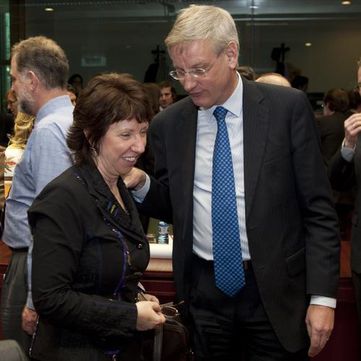The “Vale de Almeida” dossier is making waves at the Council…

(BRUSSELS2 Justus Lipsius building, Brussels) The appointment of Joao OK de Almeida, current DG External Relations of the Commission, as Head of the Delegation of the EU à Washington caused a stir among the diplomatic corps.
The one who was above all the chief of staff of José-Manuel Barroso and his sherpa at the G8 was, in fact, appointed by his former mentor, without consulting the Reports of members, according to the rules in force under the Treaty of Nice (the High Representative being barely kept informed, she would have learned the news from the press). Many saw it as an attempt by the Commission to take control of the future External Action Service. And at the Council of Foreign Ministers, this Monday in Brussels, the dispute was put on the table … during lunch. The High Representative of the EU in Foreign Affairs, Catherine Ashton took for his rank. And José-Manuel Barroso must have heard the ears ringing...
The Reports of rush in the stretchers
The first to shoot had been the Swede. Carl Picture had, in fact, split a letter to his counterparts before the week-end. He complained both about the way the appointment had been endorsed and about the drop in level. The former head of delegation, the irish Brutton, appointed in 2004 was a former Irish Prime Minister who knew how to nurture his relationships. While OK de Almeida is "only" a senior civil servant.
During the Board meeting, the secretary of state in European Affairs, Pierre Lellouche also has to express France's dissatisfaction. He shares this during the usual press briefing with the journalists. He has not yet sat down to answer our questions, which he immediately engages (obviously he wanted to talk about it even if we hadn't asked him the question). " Appointments, yes, we have to talk about them. I raised the issue over lunch. And I was approved by several delegations who approved my intervention » he explained. " We want the application of the whole Treaty, only the Treaty” he explained. “It is the High Representative who must appoint the ambassadors (of The union). But the États must be consulted. The foreign service is a tripod” And to add: we have nothing against the person of OK de Almeida. On the contrary, his appointment is rather seen with benevolence. He has many friends in Paris. It is the procedure that is in question. It is a question of method. We can't waste time in bureaucratic battles »
a gentleman agreement
A diplomat fully aware of the case then gave us some more specific information. " We cannot continue to act as if the Treaty of Lisbon did not exist. But we are indeed in a period of transition. On the one hand, there is a new treaty. On the other hand, there is not yet an External Action Service, nor a precise appointment procedure. We can't freeze all nominations until then. » Some thirty ambassador positions for the EU (30 chiefs and 2 deputies) are, in fact, currently in balance (by the summer), for the 2010 rotation, including fairly prominent positions such as that of China. " So we agreed on a gentleman agreement with the Commission. All appointments of ambassadors and heads of delegation will be made by the High Representative, after consulting a panel which will bring together representatives of the Commission, the Council Secretariat, the États members. This is the spirit of the Treaty of Lisbon. (...) And when the foreign service will be set up, and its status defined, we will only have to proceed to a confirmation».
A loss of power by the Commission
This rant can be interpreted as a double warning. The first is given to the High Representative of the EU. In nice terms, one could say that it is an encouragement to take one's autonomy vis-à-vis the Commission. In more direct terms, one could say that this means "stop being the Commission's good dog; you are also at our service". It is also a serious brake given to inclinations of power of President of the Commission, José-Manuel Barroso. The latter thus loses his ability to appoint whomever he sees fit to the delegations of the European Commission. We see, thus, to appear a rather inconspicuous aspect of the Treaty of Lisbon - perverse some would say observers - and which explains why many of states members campaigned in favor of it as well as that of a common external service -: with this new service, the Commission thus loses part of the autonomy acquired over the years. We see also a certain "renationalization" of the external delegations of the European Commission.
NB: From a strictly administrative point of view, the appointment of Vale de Almeida is made on the basis of the 2009 rotation and not on the 2010 rotation. This is how Lady Ashton's cabinet defends itself. But the explanation has a super "bureaucratic" side that is no match for more political arguments.
(photo credit: Council of the EU - Catherine Ashton et Carl Picture)
Comments closed.